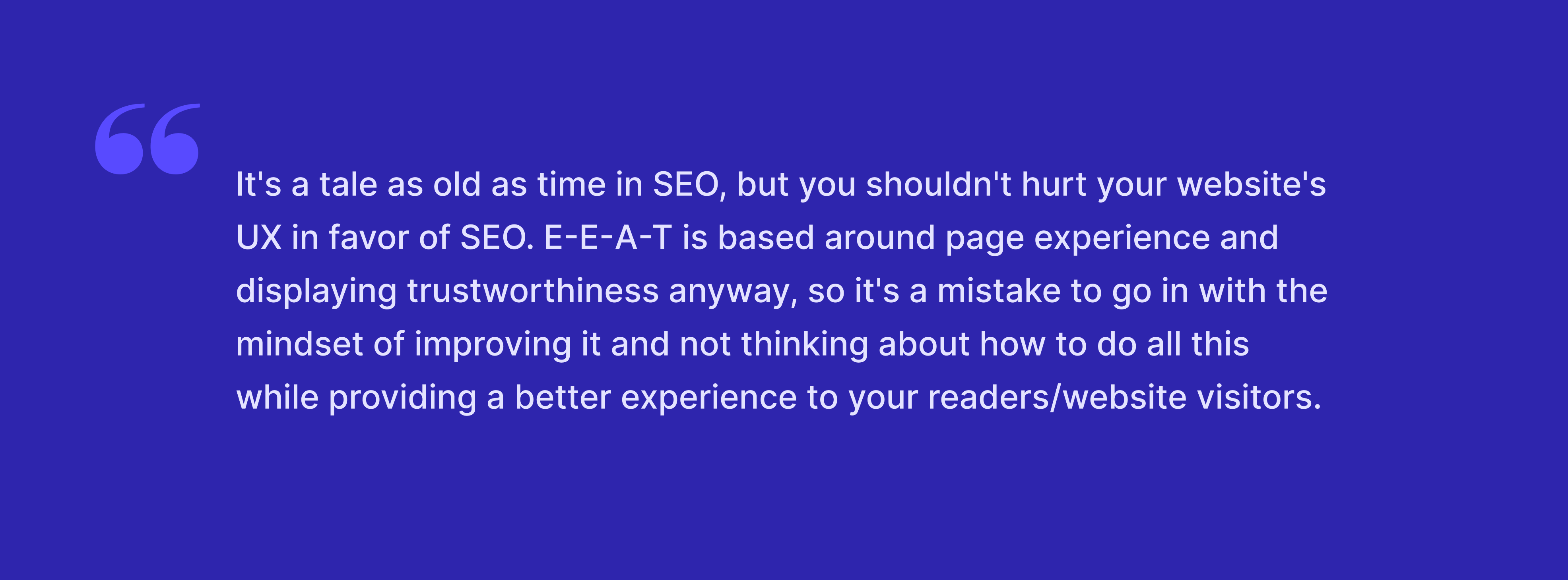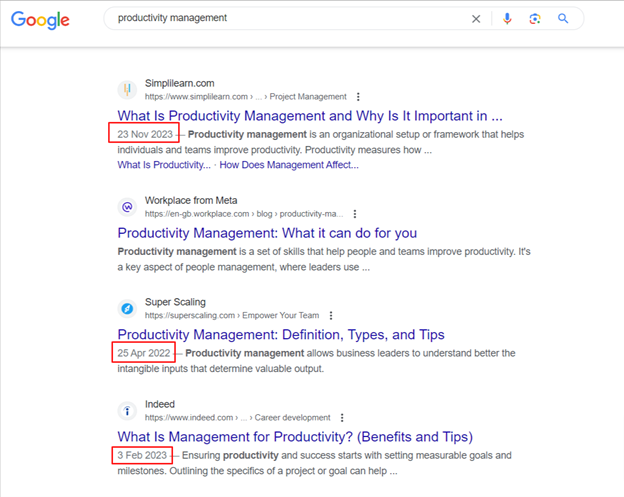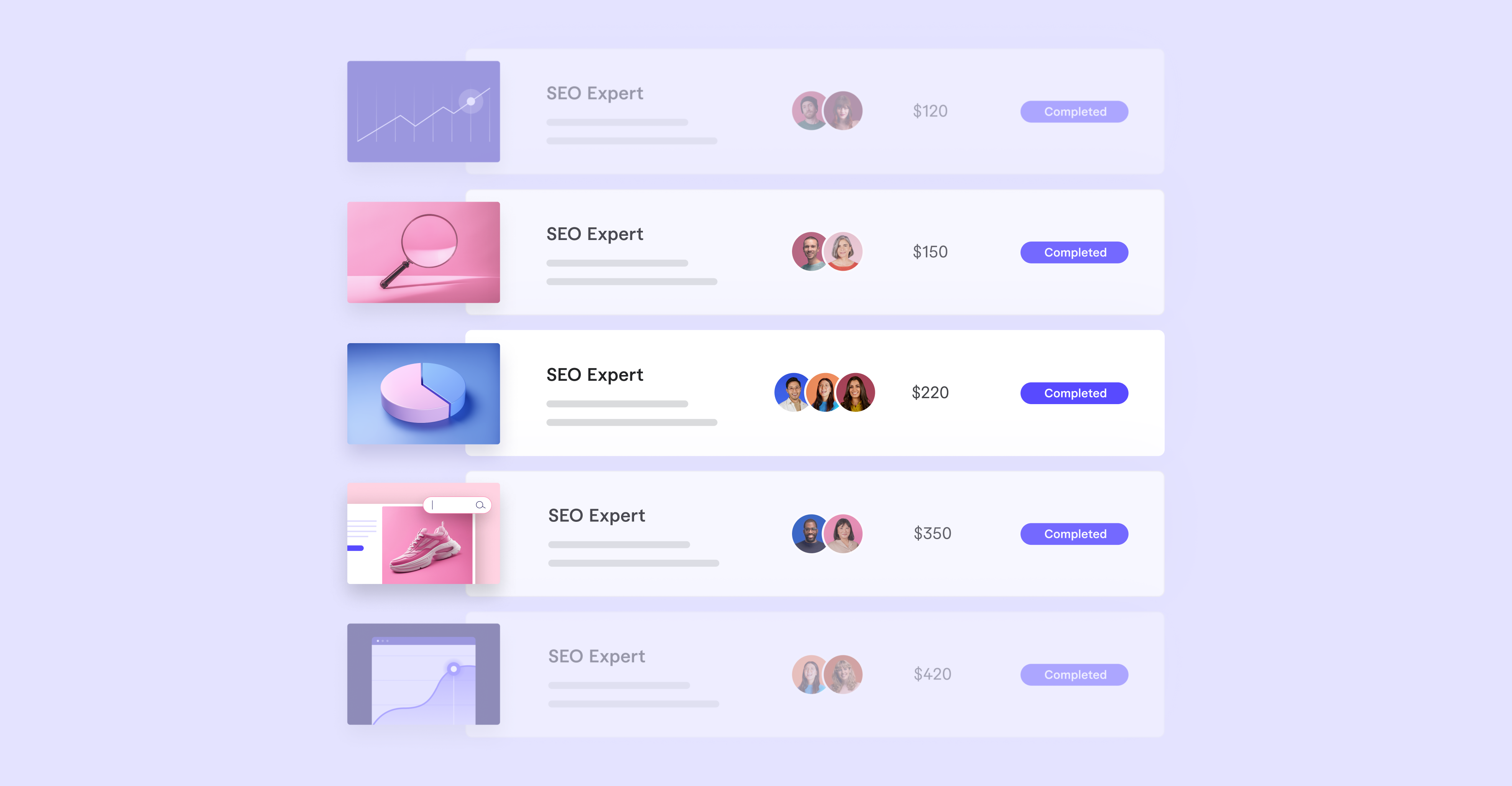This post was sponsored by Fiverr Pro. The opinions expressed in this article are the sponsor’s own.
It’s been over a year since Google added “experience” to its search quality rater E-A-T guidelines, transforming it into E-E-A-T.
However, many websites still struggle to establish a digital presence that follows these rules.
While most assume that optimizing for E-E-A-T is as simple as adding an author bio on their website, that’s not true.
Let’s look at what E-E-A-T entails and what SEO experts say about meeting these requirements.
A Quick Recap Of E-E-A-T & Its Relevance In 2024
Every year, Google releases an algorithm update to improve its algorithm’s capabilities in surfacing good content.
The most recent algorithm update was in December 2022, where Google’s search quality rater guidelines were modified to reflect the following:
- Experience (E): Indicates whether the author and website owner have the real-life experience to offer advice or commentary on a topic.
- Expertise (E): Indicates if the author has the necessary education, credentials, or market presence to speak on the topic.
- Authority (A): Assessment of the author’s and website’s authoritativeness – usually measured through industry-wide recognition, backlink quality, and signals of reputation (awards, citations, recommendations).
- Trustworthiness (T): Indicates if you offer a trustworthy website experience to your users. It combines the E-E-A part of the equation with the end-user experience to determine quality.
 Image from Fiverr Pro, January 2024
Image from Fiverr Pro, January 2024Trustworthiness is considered the horizontal bar that nests the other elements.
Taylor Scher, an SEO consultant, explains that people take the T element too seriously – creating a contradictory effect.
“It’s a tale as old as time in SEO, but you shouldn’t hurt your website’s UX in favor of SEO.
E-E-A-T is based around page experience and displaying trustworthiness anyway, so it’s a mistake to go in with the mindset of improving it and not thinking about how to do all this while providing a better experience to your readers/website visitors.”
Let’s say you’re offering advice on YMYL topics (Your Money or Your Life) like “How to treat cold at home.”
From an on-page SEO standpoint, you might have an author bio and a high domain rating.
However, from a technical SEO and user experience standpoint, the lack of SSH encryption on the website could create a subpar experience. Users might think it’s a duplicate of another medical website.
It’s a combination of these four elements that enable your success. This is why even non-YMYL sites have to up their game to stay relevant in the SERPs.
 Image created by Fiverr Pro, February 2024
Image created by Fiverr Pro, February 20247 Strategies For Optimizing Websites For E-E-A-T
Optimizing for E-E-A-T requires a complete audit of technical SEO and other tactics.
Here’s what you need to optimize:
1. Create An Author Bio & Editor Schema For Each Article
A well-written author bio does two things:
- Shows personal experience.
- Establishes the author’s expertise.
Think about it this way. Would you like to go to a finance website and see if it’s written by the company’s team or a PhD in Corporate Finance?
That said, your authors don’t need a PhD, but rather a modicum of success in the industry.
How To Create An Authoritative Author Bio
Showcase your author’s credibility by adding their:
- Years of experience.
- Areas of focus.
- Education (if applicable).
- Professional accomplishments.
- Social media/website links.
Add schema markup for editors and reviewers, even in non-YMYL industries like SaaS and renewable energy.
It goes a long way in showing the editorial integrity of your brand.
It also sends trust signals to Google’s quality raters, even though author bylines are not a ranking factor.
Pro Tip: Hire experienced freelance SEO experts to build this in your CMS’s backend.
2. Don’t Forget To State The Obvious
“Wirecutter does an incredible job at stating the obvious: each of their product reviews typically begins with a short paragraph describing the lengths they went to to produce the review,” says Jamie Sutton, Marketing Lead at HeadshotPro.
In Wirecutter’s example, they explain how they tested each one and their differences.
They also cite their sources for each interview and bedding example, adding trust in the product.
 Screenshot from Wirecutter, January 2024
Screenshot from Wirecutter, January 2024Similarly, you can explain your review process, criteria for data selection, or expert invitation.
3. Source Expertise To Improve Your Reputation
Internal expertise is not always easy to come by. That doesn’t mean you can’t look beyond your own company.
This is especially true if you’re a newer brand still working on improving your E-E-A-T.
Collaborate with industry experts and ask them to contribute when possible.
Here’s how you can do that:
- Send quote requests via HARO, Help a B2B Writer, Qwoted, etc.
- Participate in LinkedIn or Facebook groups.
- Invite thought leaders for an interview.
- Ask subject matter experts to contribute a guest post.
- Source insights from podcasts or webinars (with attribution).
Alternatively, you can pitch your brand and internal experts to get featured.
4. Write High-Quality Content With Attribution
Content lies at the center of it all.
The better the content quality, the better your reputation (with users and search raters).
Even Google has published clear-cut guidelines around this:
“People-first content means content created primarily for people, not to manipulate search engine rankings. We recommend that you focus on creating people-first content to be successful with Google Search rather than search engine-first content made primarily to gain search engine rankings. (Google)”
So, create helpful content that has depth – not breadth.
With artificial intelligence (AI) tools like ChatGPT raising the bar for the bare minimum, you need to go above and beyond with your content.
Here are a few best practices to keep in mind:
- Stick to core topics relevant to your business.
- Collaborate with other experts or companies.
- Develop topic clusters that indicate your authority.
- Avoid surface-level insights that even SGE can provide.
- Distribute content on other channels to provide external signals.
- Conduct regular content audits to identify gaps & refreshing opportunities.
Google’s algorithm prefers fresh content — published recently.
 Screenshot from search for [productivity management], January 2024
Screenshot from search for [productivity management], January 2024Additionally, cite your sources. Google’s algorithm monitors inbound and outbound links. So, cite and link to high-authority websites in your industry.
For instance, Medical News Today cites scientific journals like The Lancet in every piece.
 Image from Fiverr Pro, January 2024
Image from Fiverr Pro, January 20245. Build Backlinks From Relevant Websites
It’s 2024, and backlinks are still relevant.
A Backlinko study analyzed 11.8 million search results and found that top-ranking web pages have more backlinks than lower-ranking ones.
But there are two things to remember:
- The number of referring domains.
- Backlink quality.
The links should come from relevant websites. For instance, ecommerce fashion websites should get links from fashion and clothing publications.
Also, create valuable content that acts as link magnets.
Anurag Surya, SEO specialist at Freshworks, explains that he uses research articles to do this.
“I’d invest in creating industry-research articles that’ll have metrics based on primary research. No other websites would have these numbers, which means anyone searching for them would visit my page and hopefully link to it.”
So, build links, but build them strategically.
Pro Tip: Work with experienced link builders who can identify such opportunities for your brand.
 Image from Fiverr Pro, January 2024
Image from Fiverr Pro, January 20246. Focus On Your Online Brand Reputation
Audit your brand’s presence online.
Survey your customers, monitor incoming reviews, and observe public forums. These are common sources for getting feedback and understanding how people view your brand.
You can also use tools like UserTesting or Maze to determine if users actually consider your site trustworthy. Display social proof to appear credible in the eyes of users.
Add social proof not just from users but industry publications too.
Also, respond to good and bad reviews pleasantly. It’ll improve brand perception over time.
Ultimately, the better the brand perception, the better your overall authority.
7. Attract & Use More User-Generated Content (UGC)
User-generated content is an excellent way to increase your website’s E-E-A-T.
Why? Because an unsolicited or unpaid review does the heavy lifting for your brand’s perception.
Examples of UGC include:
- Case studies.
- Forum posts.
- Public comments.
- Ratings & reviews.
- Videos on social media.
- Personal blog posts.
Google’s crawlers can access social sites like Reddit and Quora. Make sure your reputation has a positive feel to it.
It gives you much-needed social proof and tells Google your site is a trusted resource.
 Image from Fiverr Pro, January 2024
Image from Fiverr Pro, January 2024It’s Your Time To Become Relevant
Optimizing your website for E-E-A-T requires a strategic approach.
The process can be a massive undertaking, but it doesn’t have to be. Consider outsourcing your operations to SEO experts who monitor these changes and adapt to secure their search rankings.
Ultimately, it’s a strategic decision that brings you one step closer to improving your website’s E-E-A-T.
Image Credits
Featured Image: Image by Fiverr Pro. Used with permission.
In-Post Images: Images sourced by Fiverr Pro. Used with Permission
Source link : Searchenginejournal.com
